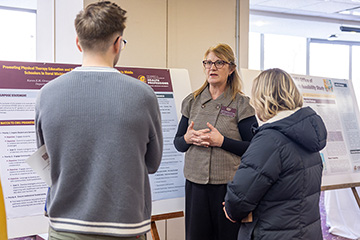Partnership brings psychiatrists to those in need
Loan forgiveness helps recruit physicians
Jisselly Salcedo is wrapping up a psychiatry residency and taking a faculty position with CMU Health treating patients at Saginaw’s only hospital with inpatient psychiatric services. She is among the first graduates of a program that helps place physicians in underserved parts of the state.
“I feel very proud to be one of the first people to go through MIDOCs,” she said. Salcedo moved to her residency after graduating from the Central Michigan University College of Medicine in 2019. Once she completes the MIDOCs program, she’d like to serve in a fellowship focused on elderly care.
Incentives to serve the underserved
MIDOCS incentivizes physicians to serve underserved communities. Participants who work in such communities for two years are also eligible for up to $75,000 in loan forgiveness. Psychiatry is one of six qualifying specialties.
Most Michigan counties – 75 of 83 – are at least partly designated as underserved. Studies show that physicians trained in community-based settings are more likely to practice medicine in underserved areas after their residency.
The program was developed at the state level, with the Legislature financing an implementation plan in 2017 and then putting money towards it in 2019. It predated the COVID-19 pandemic, which has made a growing shortage of doctors more severe.
The root cause: Doctors were retiring at faster rate than new ones could receive adequate training. Adding to that, the stress and burnout of the pandemic.
“There’s such a huge need for psychiatrists,” said Bethany Figg, director of graduate medical education for CMU Medical Education Partners.
Bringing physicians to Saginaw
Over the four years, CMU has placed a total of eight – two per year – psychiatric residents through the program, which it sponsors through CMEP. Saginaw qualifies as an underserved area, so the psychiatry residents who work there will ultimately put in six years of work in an underserved area.
Across the specialties, the college has placed a total of 19 residents in its Saginaw facility. Four more will join them in July, including two new psychiatrists.
The resident psychiatrists aren’t just seeing patients in Saginaw. Earlier this year, the college residents also started providing psychiatric services via telehealth. One of them was Christopher Le.
Le has consulted with patients from all over the state, including rural northern Michigan where access to mental health services is constrained by a lack of providers.
“Our patients come from everywhere,” he said.
Salcedo spent the last year working in an inpatient clinic caring for people who would otherwise lack the financial means to receive psychiatric care. The work helped her develop relationships with them.
“You really get to appreciate the patient population here,” she said.
One group that Le helped stood out to him: veterans. He treated veterans in the third year of his residency in Saginaw’s VA clinic.




